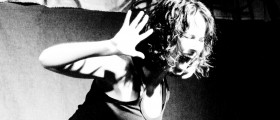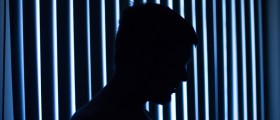I've suffered from clinical depression for most of my life, accompanied by generalized anxiety disorder. I had only been experiencing anxiety attacks for around 5 years now. They used to be 'rare' and only in times of very severe distress but gradually became more consistent, once or twice a month I'd say but it depends on how bad my month is going. I'd have hyperventilation, racing heart, fear of losing control or dying, and more often than not I'd be crying & sobbing prior to having them, so the sobbing would usually continue/interfere with hyperventilating. Which are all 'normal'/common symptoms of anxiety attacks, however within the past couple of months / a year at most, they've increased to multiple times a month, sometimes days in a row. Surely that just has to do with my disintegrating tolerance for stressors in my life, but also increase of stressors / and is situational, but the physical symptoms recently started getting worse within the past 3 months, I still get all the other symptoms in the time of the attacks but now they also include dizziness, loss of feeling and tingling in parts of my body including face, loss of balance (and have abruptly fallen as a result of it) and one thing that's stuck out the most was in between sobbing and usually in the midst of hyperventilation I begin to laugh uncontrollably. I've been trying to figure out if this is normal for anxiety attacks since it began and so far I'm sorta at a loss for trying to find someone experiencing the same thing. I've read about some people having anxiety triggered laughter but all of the stuff regarding that said that it's your body's way of relief and expressing strong emotion in a time of severe distress, however that doesn't seem to add up to my case because at the times this has happened, hence not being in control of the laughter (and sobbing too but I actually had a reason to sob) it didn't provide relief or was a beneficial release of emotion, I was alone so I didn't attempt to stop from embarrassment or anything but I tried to stop because my chest began to hurt and I felt like I was gonna choke or something, but it didn't stop until after 7-10 minutes, which was when everything else began to subside too. The anxiety attack was a bit gradual but happened in the span of 2 minutes and the laughter started after I lost balance and fell to the floor (I didn't injure myself or hit anything I was somewhat in a sitting position) it wasn't laughter from anything that was going on in that exact moment and I can't think of any reasons why I would laugh at what triggered the anxiety attack, the anxiety attack was triggered by me thinking about a few things in my life that were/still do cause extreme distress, sadness, & frustration. I don't find any of it funny in the slightest. Crying sometimes still occurs while the laughing happens and I just assume it's because I was already sobbing and crying is in sync with my emotions at the time whereas laughter is not. Every time I had an anxiety attack like this (happened about 3 or 4 times with laughter and only a couple more times without) within the past 3 months, it's been triggered by the thoughts of the same events. Anxiety attacks aren't super new to me but ones like this are, the triggers aren't new things either, but this year I've had to think and be reminded of a lot of distressing situations that happened when I was younger. The only other time prior to the past 3 months that I can remember having a laughing fit in the midst of an anxiety attack was just one time nearly 3 years ago I was distraught about some lies / rumors a former friend of mine was telling people about me, and I began having an anxiety/panic attack in front of my mom explaining they weren't true (because it was a lie that I had done something really illegal so I was panicking badly) and I began hyperventilating, sobbing and laughing, and that's the only time it happened in front of someone but I don't recall her realizing it was a laugh because maybe sounded a bit similar to my sobbing, that or she was too caught up in the situation to realize or care. Because at that time it never even occurred I was laughing until after, and I just dismissed it because that was the least of my worries.
But lately the stuff that have been triggering the anxiety attacks have been bothering me a lot lately and I've been wanting to bring it up to my therapist, which I struggle to do regardless so actually the first time the laughing fit happened during an anxiety attack (excluding the one time years ago) was the time I was home alone venting to my voice memos app to try and practice how I'd bring up my stressors to my therapist, I stopped audio recording as soon as I began hyperventilating because at that point I was like what's the point but now I guess since that first happened 3 months ago, I never even contemplated bringing it up with my therapist (meaning the the stressors, but I also have been hesitant to mention the anxiety attacks as well) because I'm afraid that'll happen in front of her. The 3-4 times these recent anxiety attacks have happened, were when I was home alone, first being when I was trying to vent to myself and to my voice memos to try and figure out how to express everything to my therapist, and the other times were solely because I thought about the factors of my stress I apologize if this is lengthy, I just can't keep letting everything build up I guess.
A few clarifications that may be relevant to responses/suggestions/advice, I've read about potential causes of emotional incontinence a lot whilst trying to figure out what's going on and while I've never been tested for any disorders or problems like MS, Parkinson's, PBA, brain damage & brain tumors, I'm pretty confident I don't have any of those and because of my circumstances I feel like it's most likely linked to anxiety in some way but as stated earlier, it's involuntary & does not provide any sort of physical or mental relief.
TLDR/Summary: Recent anxiety attacks have included involuntary laughter that don't provide any form of relief or benefit, and were out of sync with the emotions I was feeling. What could be causing this?
Loading...
Hello, guest.
Your description of your recent anxiety attacks, including new symptoms like dizziness, loss of feeling, tingling, loss of balance, and particularly involuntary laughter, is quite concerning and understandably distressing. The addition of these new symptoms to your existing experiences with anxiety attacks is significant and warrants professional attention.
Involuntary laughter during an anxiety attack, which doesn't align with your emotional state and doesn't provide relief, could be an example of what's sometimes called "emotional incontinence" or a form of emotional dysregulation. This can occur in various neurological or psychiatric conditions, but it's also possible in situations of extreme stress or emotional turmoil. The fact that these laughter episodes are involuntary and are accompanied by other distressing physical symptoms emphasizes the need for professional evaluation.
It's important to discuss these developments with your therapist. I understand your hesitation, especially if you're worried about experiencing these symptoms during a session, but remember that therapists are trained to handle such situations. They can provide a safe space to explore these issues and may help in understanding the underlying causes. Additionally, your therapist can adjust your treatment plan accordingly or refer you to other specialists if necessary.
Given the complexity of your symptoms, it might also be beneficial to consult with a medical doctor, such as a neurologist or psychiatrist, for a thorough evaluation. They can help rule out any physical causes and provide insight into whether these symptoms are purely anxiety-related or indicative of another underlying issue.
In the meantime, it could be helpful to continue documenting these episodes, as you've been doing with the voice memos. This documentation can provide valuable information for your healthcare providers.
Lastly, while it's good that you've been researching potential causes, it's crucial to avoid self-diagnosis and instead rely on professional guidance. Each individual's experience with mental health issues is unique, and what you're experiencing needs a personalized approach for diagnosis and treatment.
Loading...
















,-Asthma-And-Anxiety_f_280x120.jpg)